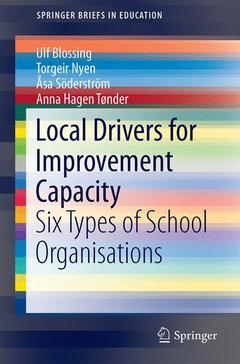Description
Local Drivers for Improvement Capacity, 2015
Six Types of School Organisations
SpringerBriefs in Education Series
Authors: Blossing Ulf, Nyen Torgeir, Söderström Åsa, Hagen Tønder Anna
Language: English
Subject for Local Drivers for Improvement Capacity:
58.01 €
In Print (Delivery period: 15 days).
Add to cart74 p. · 15.5x23.5 cm · Paperback
Description
/li>Contents
/li>Comment
/li>
This book presents systematically six types of schools, with different improvement capacities. Different schools have different capacities for school improvement, depending on the school infrastructure, norms and routines for the improvement process, improvement roles, and improvement history. The organisation of the improvement capacity is understood on the basis of sensemaking processes among teachers and school leaders. The book focuses on the challenges for each type of school in their improvement work, and which situations and circumstances they need to take into account. The school types are illustrated with detailed descriptions of six schools, coming from an evaluation of a Norwegian school development program. The book fills a need in school organisations to have concrete illustrations from similar schools of how teacher teams are organised, how leadership is exercised and processes are organised in their efforts of improving the organisation and building a complex and effective capacity. Schools? improvement capacity has become an important feature in school management and leadership as well as in research as western states have decentralised governance to the local level. The expectations on school leaders as well as on teachers are high when it comes to improve their schools to raise student outcome. Accounts of professional school cultures and professional learning communities often describe in an overall perspective the ideal school where such an improvement capacity is in work. However, accounts of the many ways of organising the capacity which perhaps are not all in all ideal or effective also contribute to the knowledge of the local school process.
Preface.- 1. Introduction.- Local Support and Challenges in Educational Policy.- References.- 2. Organisational Perspectives on Schools and Change.- Instrumental and Institutional Perspectives on Organisations.- Schools’ Improvement Capacity.- The Need for Focusing on Teaching Practices.- The Need to Consider Means- versus Goal-Situated Strategies.- References.- 3. Method.- Sampling.- Procedure.- Analysis.- School Types as Basis for Describing School Organisations.- Comments on the Construction of Types.- References.- 4. Six School Types.- Overview.- The Idea-Driven School.- The Plan-Driven School.- The Model-Driven School.- The Problem-Driven School.- The Profession-Driven School.- The Team-Driven School.- 5. Concluding Reflections.- The Sensemaking Organisation of Capacity.- Supporting Local Capacity-Building.- Support from the Central Educational System.- References.
Provides concrete illustrations of how teacher teams, leadership and processes are organised in their efforts to improve their schools
Provides understanding of the organisation on the basis of sensemaking processes
Presents six school types with their own typology, case school and improvement advice
Points out the delicate balance between state governance and local school improvement processes
Includes supplementary material: sn.pub/extras

